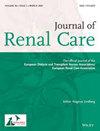Educational or Behavioural Interventions to Improve Long-Term Haemodialysis Vascular Access Self-Management: A Systematic Review
Abstract
Background
Globally, haemodialysis is the most frequent type of kidney replacement therapy and necessitates access to the bloodstream either through a native arteriovenous fistula, arteriovenous graft or central venous catheter. Vascular access complications are a major cause of morbidity and mortality in adults receiving haemodialysis, and effective vascular access self-management is required.
Objective
To examine the effectiveness of educational or behavioural interventions designed to improve self-management of long-term vascular access in adults receiving haemodialysis.
Design
Systematic review.
Method
English language publications from January 2013 to May 2023 retrieved from PubMed, Embase, CINAHL, Cochrane Library, PsycINFO and Joanna Briggs Institute (JBI) databases were undertaken. Two independent reviewers identified studies for full-text review, data extraction and quality assessment. Data synthesis and quality assessment followed the JBI guidelines for quantitative reviews.
Results
Seven studies involving 540 participants were included: two studies were randomised control trials and five were quasiexperimental. All studies involved patient education, predominantly provided by nurses, and employed a variety of teaching resources, such as education booklets, practical demonstrations and videos. Outcomes measured included vascular access self-management behaviours, self-efficacy and vascular access knowledge although there was no consistency between studies. Overall, vascular access self-management significantly improved following education.
Conclusion
Educational interventions led to improvements in self-management behaviours in adults with long-term haemodialysis vascular access. However, there was insufficient evidence for the delivery and duration of intervention education. Further research is needed. An evidence-based nurse-led codesign intervention could lead to improvements in vascular access self-management.


 求助内容:
求助内容: 应助结果提醒方式:
应助结果提醒方式:


